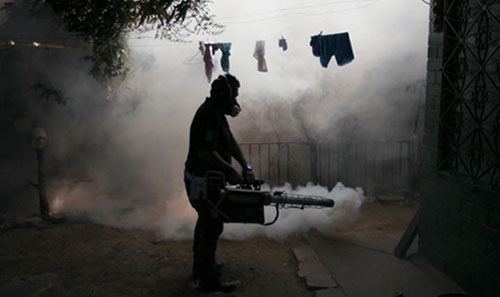Olympic organizers say Zika problem to decline in time
Rio Olympics organizers said Tuesday they are concerned by the outbreak of the Zika virus in Brazil, but confident the problem will have cleared up in time for the Games.
More than 1.5 million Brazilians are estimated to have been infected by the mosquito-transmitted Zika virus over the last few months. Most suffer few symptoms, but the virus is believed to be linked to birth defects in babies born to women who were pregnant when they were infected.
Despite international alarm, Rio will be able to run the Games without problem because by their start on August 5, the main mosquito season is over, officials told a press conference.
"In August, the number of mosquitos falls dramatically and the number of Zika cases will mirror this fall," said Joao Grangeiro, head of medical services for the Rio 2016 organizing committee.
Brazil has warned pregnant women not to travel to the country, echoing previous warnings by the United States and other countries.
However, Rio 2016 spokesman Mario Andrada said, "We are sure we will win this battle and it will not affect the Games."
Grangeiro said that precautions would still be taken and that athletes and tourists should wear "appropriate clothing," close windows and use repellant.
The most important measure, he said, was to continue ongoing work to rid the city of mosquito breeding sites -- often just pools of stagnant water -- "and to maintain permanent vigilance on possible areas where they could start."
The main birth defect blamed on Zika is microcephaly, in which the child is born with a small head.
Rio Olympics organizers said Tuesday they are concerned by the outbreak of the Zika virus in Brazil, but confident the problem will have cleared up in time for the Games.
More than 1.5 million Brazilians are estimated to have been infected by the mosquito-transmitted Zika virus over the last few months. Most suffer few symptoms, but the virus is believed to be linked to birth defects in babies born to women who were pregnant when they were infected.
Despite international alarm, Rio will be able to run the Games without problem because by their start on August 5, the main mosquito season is over, officials told a press conference.
"In August, the number of mosquitos falls dramatically and the number of Zika cases will mirror this fall," said Joao Grangeiro, head of medical services for the Rio 2016 organizing committee.
Brazil has warned pregnant women not to travel to the country, echoing previous warnings by the United States and other countries.
However, Rio 2016 spokesman Mario Andrada said, "We are sure we will win this battle and it will not affect the Games."
Grangeiro said that precautions would still be taken and that athletes and tourists should wear "appropriate clothing," close windows and use repellant.
The most important measure, he said, was to continue ongoing work to rid the city of mosquito breeding sites -- often just pools of stagnant water -- "and to maintain permanent vigilance on possible areas where they could start."
The main birth defect blamed on Zika is microcephaly, in which the child is born with a small head.
Photo: www.cbsnews.com
Related Posts

